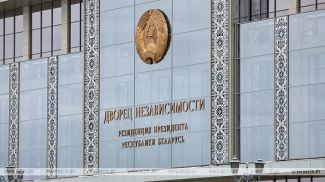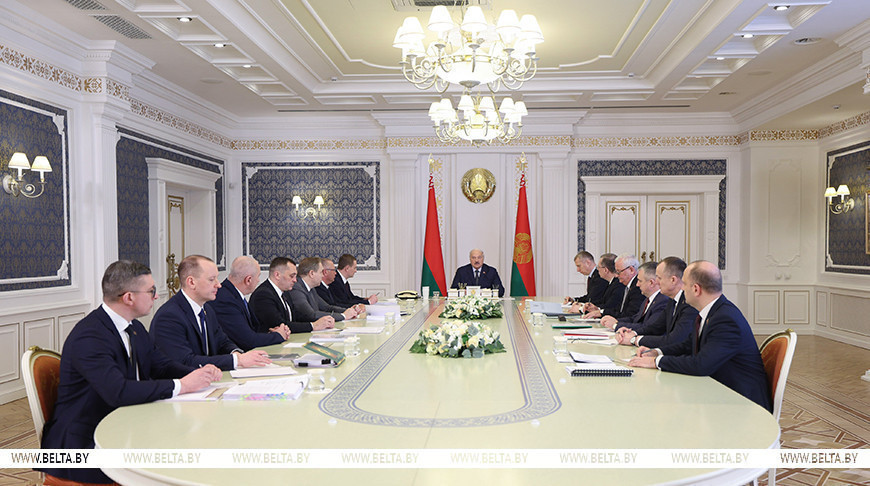
MINSK, 28 March (BelTA) – The finalized draft decree on ways of improving the efficiency of control and oversight activities has been submitted to Belarusian President Aleksandr Lukashenko. The document was reviewed at a meeting with the head of state on 28 March, BelTA has learned.
This matter was previously discussed during a meeting hosted by the president in May 2024. Then Aleksandr Lukashenko instructed to finalize the draft decree to ensure the document was clear and convenient for use. The head of state also asked the supervisory bodies to change their style and methods of work and enhance the efficiency of their activities.

"We agreed that the government together with regional executive committees would finalize the draft decree on improving the efficiency of these activities. We reviewed the initial version and agreed to fine-tune it. We decided to revise the legislation and prepare another document to address all these issues without amending and supplementing the existing legal acts," the head of state said.

The appropriate draft decree was prepared by the government and was further studied by the State Control Committee of Belarus as the president instructed.
During the meeting, Aleksandr Lukashenko decided to carefully analyze the submitted proposals and questioned several matters.
For instance, it was proposed to strengthen the preventive role of control activities. "I would like the authors of this idea to explain, based on real-life examples, how we can strengthen the preventive role of control activities," the president said. "The principle they suggest is 'better to prevent and correct mistakes than to punish.' Well, of course. But how do we do it?"


It was also stated that supervisory bodies should be proactive, and Aleksandr Lukashenko supports this idea. The meeting also discussed proposals to provide enterprises with advance information about general violations, avoid excessive interference in the activities of well-functioning enterprises and help them prevent violations.
The head of state drew attention to the wording "excessive interference" and "well-functioning enterprises". He asked how exactly these norms should be interpreted and what impact the decree would have.
The same applies to reducing the number of inspection of businesses. "Are you overdoing with inspections again, not allowing businesses to work?" the head of state asked.
"No, we are not," Chairman of the State Control Committee Vasily Gerasimov said.

 "Well, you see, he says everything is okay. You offer the golden mean. I am totally against it. There should be no collusion, no golden mean. There is the law, and it must be followed. Everything is spelled out in the law," Aleksandr Lukashenko emphasized.
"Well, you see, he says everything is okay. You offer the golden mean. I am totally against it. There should be no collusion, no golden mean. There is the law, and it must be followed. Everything is spelled out in the law," Aleksandr Lukashenko emphasized.
The head of state once again emphasized the importance of clarity and unambiguity of wording, citing the example of a fair pricing formula that the government is working on. Commenting on some of the proposals, Aleksandr Lukashenko noted that the question may arise as to what exactly socially important goods are and what criteria should be used to classify certain products as such. “If we follow the old ways, we're unlikely to work out something,” he said.
The keynote speaker at the meeting was Taxes and Duties Minister Dmitry Kiyko. The ministry he is in charge of has crafted the draft decree. He noted that the new comprehensive document is based on the norms of the current legislation in terms of forms of control, methods of control, inspections and other procedures. “These norms have proven themselves. They give the supervisory bodies the necessary tools,” the minister said. “The forms of control and the levels of decision-making exclude unnecessary interference in the work of the subjects.”
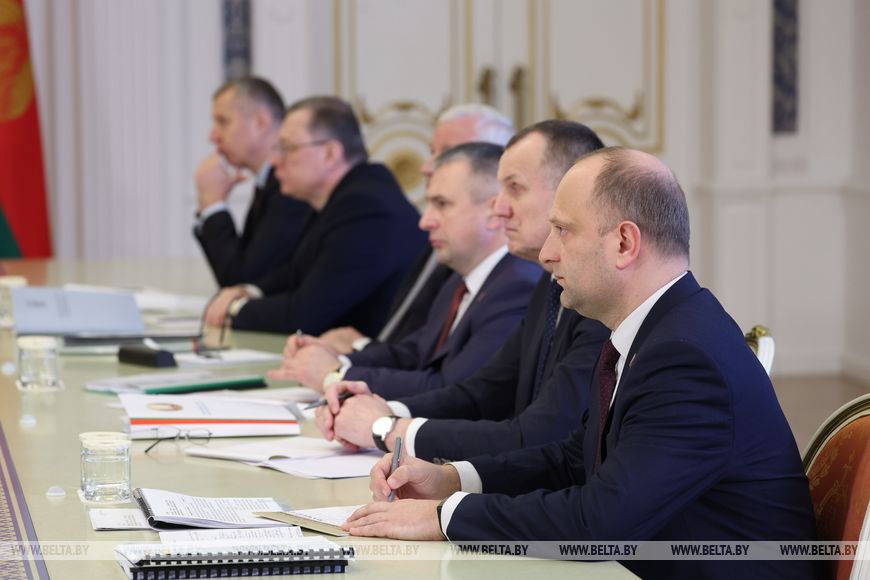
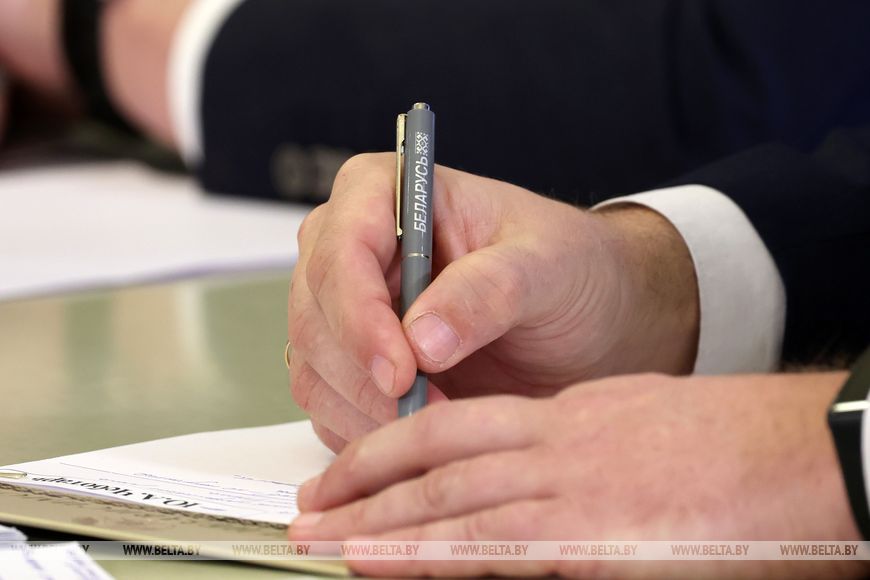
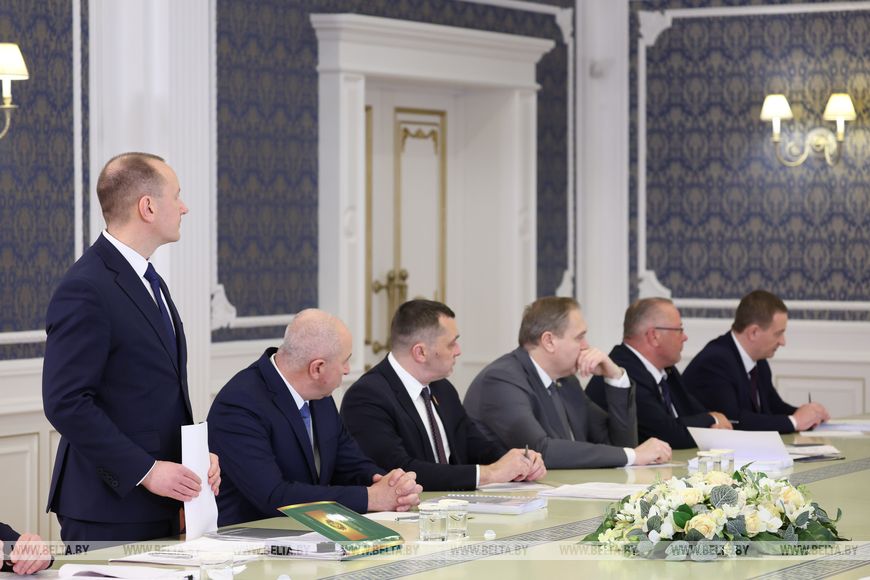
This matter was previously discussed during a meeting hosted by the president in May 2024. Then Aleksandr Lukashenko instructed to finalize the draft decree to ensure the document was clear and convenient for use. The head of state also asked the supervisory bodies to change their style and methods of work and enhance the efficiency of their activities.

"We agreed that the government together with regional executive committees would finalize the draft decree on improving the efficiency of these activities. We reviewed the initial version and agreed to fine-tune it. We decided to revise the legislation and prepare another document to address all these issues without amending and supplementing the existing legal acts," the head of state said.

The appropriate draft decree was prepared by the government and was further studied by the State Control Committee of Belarus as the president instructed.
During the meeting, Aleksandr Lukashenko decided to carefully analyze the submitted proposals and questioned several matters.
For instance, it was proposed to strengthen the preventive role of control activities. "I would like the authors of this idea to explain, based on real-life examples, how we can strengthen the preventive role of control activities," the president said. "The principle they suggest is 'better to prevent and correct mistakes than to punish.' Well, of course. But how do we do it?"


It was also stated that supervisory bodies should be proactive, and Aleksandr Lukashenko supports this idea. The meeting also discussed proposals to provide enterprises with advance information about general violations, avoid excessive interference in the activities of well-functioning enterprises and help them prevent violations.
The head of state drew attention to the wording "excessive interference" and "well-functioning enterprises". He asked how exactly these norms should be interpreted and what impact the decree would have.
The same applies to reducing the number of inspection of businesses. "Are you overdoing with inspections again, not allowing businesses to work?" the head of state asked.
"No, we are not," Chairman of the State Control Committee Vasily Gerasimov said.

 "Well, you see, he says everything is okay. You offer the golden mean. I am totally against it. There should be no collusion, no golden mean. There is the law, and it must be followed. Everything is spelled out in the law," Aleksandr Lukashenko emphasized.
"Well, you see, he says everything is okay. You offer the golden mean. I am totally against it. There should be no collusion, no golden mean. There is the law, and it must be followed. Everything is spelled out in the law," Aleksandr Lukashenko emphasized. Returning to the topic of prevention, the head of state stressed its importance. “The supervisory bodies should be engaged in the prevention efforts. This work should involve everyone, it seems to me. From the president to the chairman of a village council. We tell everyone: do not steal, pay your taxes, make profits and pay wages to people,” the president noted.
The head of state once again emphasized the importance of clarity and unambiguity of wording, citing the example of a fair pricing formula that the government is working on. Commenting on some of the proposals, Aleksandr Lukashenko noted that the question may arise as to what exactly socially important goods are and what criteria should be used to classify certain products as such. “If we follow the old ways, we're unlikely to work out something,” he said.
The keynote speaker at the meeting was Taxes and Duties Minister Dmitry Kiyko. The ministry he is in charge of has crafted the draft decree. He noted that the new comprehensive document is based on the norms of the current legislation in terms of forms of control, methods of control, inspections and other procedures. “These norms have proven themselves. They give the supervisory bodies the necessary tools,” the minister said. “The forms of control and the levels of decision-making exclude unnecessary interference in the work of the subjects.”
A number of innovations have been suggested as well. In general, they are about shifting the focus towards prevention of offenses, identification of causes and conditions that may contribute to the commission of offenses. According to Dmitry Kiyko, watchdogs have already been doing it. Yet, this activity has not been regulated in a single document on control activities.
“I am not against preventive measures. Let it be written down a thousand times. Everything should not be reduced to preventive measures only, however. Otherwise, everything will be done in vain,” Aleksandr Lukashenko said.
He drew attention to the proposal to introduce a ban on random inspections of bona fide entities conducted more than once every five years. “I have a question: why is it five years, not two or three years, not 10 years? What is “bona fide”? All economists are present today here,” the president said.
The head of state took note of possible corruption here:“Thanks to friends, acquaintances, everyone may soon become “bona fide”. There will be no one to check. They may decide not to pay taxes and that’s it”. “Most importantly, why do we forbid the high ranking official [the chairman of the State Control Committee], who heads the highest body, to decide where to run inspections and where not?” Aleksandr Lukashenko asked.
“I am not against preventive measures. Let it be written down a thousand times. Everything should not be reduced to preventive measures only, however. Otherwise, everything will be done in vain,” Aleksandr Lukashenko said.
He drew attention to the proposal to introduce a ban on random inspections of bona fide entities conducted more than once every five years. “I have a question: why is it five years, not two or three years, not 10 years? What is “bona fide”? All economists are present today here,” the president said.
The head of state took note of possible corruption here:“Thanks to friends, acquaintances, everyone may soon become “bona fide”. There will be no one to check. They may decide not to pay taxes and that’s it”. “Most importantly, why do we forbid the high ranking official [the chairman of the State Control Committee], who heads the highest body, to decide where to run inspections and where not?” Aleksandr Lukashenko asked.
Dmitry Kiiko explained that bona fide entities will have to meet certain requirements related to their operation, payment of taxes, and so on. The right to approve a list of such requirements is proposed to be granted to the Council of Ministers, the State Control Committee, and the Prosecutor General's Office. "But if a financial watchdog agency finds out that this entity, despite its status, commits violations, an unscheduled inspection may be arranged," the minister said.
The president responded: "Inspections are prohibited, but there is a caveat. Why are we formalizing something that will not work? We have banned inspections, but this caveat will render this ban ineffective."
Dmitry Kiiko admitted certain impartiality, but he believes that less frequent inspections will be a boon for business entities.
Chairman of the State Control Committee Vasily Gerasimov also poked holes in Dmitry Kiiko’s report. For example, he took issue with the suggestion for watchdogs to post information about companies’ violations on the Internet. “If all regulatory and supervisory bodies start putting out such information, our business entities will look like the worst in the world,” he noted.
“Will businesses want this information to be posted in the public domain?” the head of state asked.
The president responded: "Inspections are prohibited, but there is a caveat. Why are we formalizing something that will not work? We have banned inspections, but this caveat will render this ban ineffective."
Dmitry Kiiko admitted certain impartiality, but he believes that less frequent inspections will be a boon for business entities.
Chairman of the State Control Committee Vasily Gerasimov also poked holes in Dmitry Kiiko’s report. For example, he took issue with the suggestion for watchdogs to post information about companies’ violations on the Internet. “If all regulatory and supervisory bodies start putting out such information, our business entities will look like the worst in the world,” he noted.
“Will businesses want this information to be posted in the public domain?” the head of state asked.
"This is about business reputation," Vasily Gerasimov stated emphasizing that there should be no excesses.
Aleksandr Lukashenko suggested putting together analytical materials that examine various common violations, although supervisory bodies are already engaged in this activity.
Vasily Gerasimov did not support the proposal that the State Control Committee should follow explanations from local government bodies, for example, on how specific taxes should be paid. Such explanations may vary significantly and depend on individual interpretations. These explanations turn from the level of opinion into almost a law. "This is a direct path to corruption. If every official in the state starts signing documents for business entities and we are obliged to follow them, they will sign whatever they want," he warned.

Addressing the document's authors, Aleksandr Lukashenko said: "This issue needs to be clearly defined or not mentioned at all, if that's possible. What kind of decree is this? You are telling me how you understand it and how you would like to see it. This is not a wish list."
Following the meeting, the president instructed to finalize the draft decree once again and address several issues raised during the discussion. The relevant state bodies will need to find a compromise, revise approaches and produce a document of proper quality. This work will be organized in the near future.
Aleksandr Lukashenko suggested putting together analytical materials that examine various common violations, although supervisory bodies are already engaged in this activity.
Vasily Gerasimov did not support the proposal that the State Control Committee should follow explanations from local government bodies, for example, on how specific taxes should be paid. Such explanations may vary significantly and depend on individual interpretations. These explanations turn from the level of opinion into almost a law. "This is a direct path to corruption. If every official in the state starts signing documents for business entities and we are obliged to follow them, they will sign whatever they want," he warned.

Addressing the document's authors, Aleksandr Lukashenko said: "This issue needs to be clearly defined or not mentioned at all, if that's possible. What kind of decree is this? You are telling me how you understand it and how you would like to see it. This is not a wish list."
Following the meeting, the president instructed to finalize the draft decree once again and address several issues raised during the discussion. The relevant state bodies will need to find a compromise, revise approaches and produce a document of proper quality. This work will be organized in the near future.




